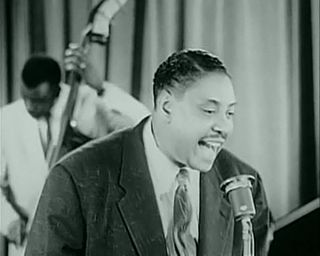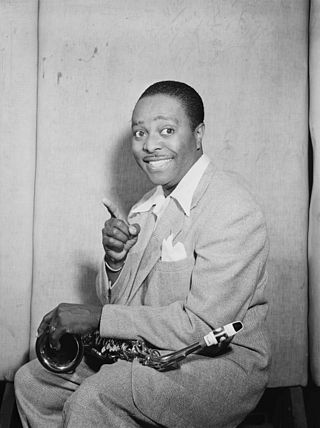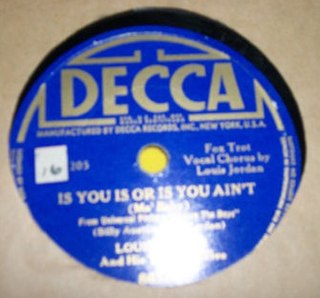
Rhythm and blues, frequently abbreviated as R&B or R'n'B, is a genre of popular music that originated within African-American communities in the 1940s. The term was originally used by record companies to describe recordings marketed predominantly to African Americans, at a time when "rocking, jazz based music ... [with a] heavy, insistent beat" was becoming more popular. In the commercial rhythm and blues music typical of the 1950s through the 1970s, the bands usually consisted of a piano, one or two guitars, bass, drums, one or more saxophones, and sometimes background vocalists. R&B lyrical themes often encapsulate the African-American history and experience of pain and the quest for freedom and joy, as well as triumphs and failures in terms of societal racism, oppression, relationships, economics, and aspirations.

Louis Thomas Jordan was an American saxophonist, multi-instrumentalist, songwriter and bandleader who was popular from the late 1930s to the early 1950s. Known as "the King of the Jukebox", he earned his highest profile towards the end of the swing era. He was inducted into the Rock and Roll Hall of Fame as an "early influence" in 1987.
Jump blues is an up-tempo style of blues, jazz, and boogie woogie usually played by small groups and featuring horn instruments. It was popular in the 1940s and was a precursor of rhythm and blues and rock and roll. Appreciation of jump blues was renewed in the 1990s as part of the swing revival.
Linked here are Billboard magazine's number-one rhythm and blues hits. The Billboard R&B chart is today known as the Hot R&B/Hip-Hop Songs chart.
"Saturday Night Fish Fry" is a jump blues song written by Louis Jordan and Ellis Lawrence Walsh, best known through the version recorded by Louis Jordan and His Tympany Five. The recording is considered to be one of the "excellent and commercially successful" examples of the jump blues genre.

"Is You Is or Is You Ain't My Baby" is a song written by Louis Jordan and Billy Austin. The song's first recording, by Jordan, was made on October 4, 1943. It was released as the B-side of a single with "G.I. Jive" with the title "Is You Is or Is You Ain't ". The song reached No. 1 on the US folk/country charts, number two for three weeks on the pop chart, and number three on the R&B chart.

"Caldonia" is a jump blues song, first recorded in 1945 by Louis Jordan and his Tympany Five. Although credited to Fleecie Moore, his wife at the time, Jordan is the actual songwriter. The song was a hit for Jordan as well as several other musicians.
"Choo Choo Ch'Boogie" is a popular song written by Vaughn Horton, Denver Darling, and Milt Gabler.
The Hot R&B/Hip-Hop Songs chart ranks the most popular R&B and hip hop songs in the United States and is published weekly by Billboard. Rankings are based on a measure of radio airplay, sales data, and streaming activity. The chart had 100 positions but was shortened to 50 positions in October 2012.

Tympany Five was a successful and influential American rhythm and blues and jazz dance band founded by Louis Jordan in 1938. The group was composed of a horn section of three to five different pieces and also drums, double bass, guitar and piano.
"G.I. Jive" is a 1944 song written and originally performed by Johnny Mercer.

"Ain't Nobody Here but Us Chickens" is a jump blues song, written by Alex Kramer and Joan Whitney. Louis Jordan and his Tympany Five recorded the song on June 26, 1946, and Decca Records released it on a 78 rpm record. It was added to the Grammy Hall of Fame in 2013.

"Early in the Mornin'" or "'Early in the Morning" is a song that was recorded by Louis Jordan and His Tympany Five in 1947. It is an early example of a blues which incorporates Afro-Cuban rhythms and percussive instruments. "Early in the Mornin'" became a hit, reaching number three in Billboard magazine's race records chart.
"We Gonna Move to the Outskirts of Town" is a song originally recorded on September 3, 1936, by Piedmont blues musician Casey Bill Weldon. Weldon performed it as a solo piece, with vocals and acoustic guitar plus piano and double bass accompaniment.

"That Chick's Too Young to Fry" is a song written by Tommy Edwards and Jimmy Hilliard. It was performed by Louis Jordan and his Tympany Five, recorded in January 1946, and released on the Decca label. The record's "B" side was "Choo Choo Ch'Boogie".

"Reconversion Blues" is a song attributed to Steve Graham and Fleecie Moore. It was performed by Louis Jordan and his Tympany Five, recorded in October 1946, and released on the Decca label. The record's "B" side was "Salt Pork, West Virginia".

"Knock Me a Kiss" is a song written by Mike Jackson (music) and Andy Razaf (lyrics). It was performed by Louis Jordan and his Tympany Five, recorded in November 1941, and released on the Decca label. The B-side was "I'm Gonna Move to the Outskirts of Town".










